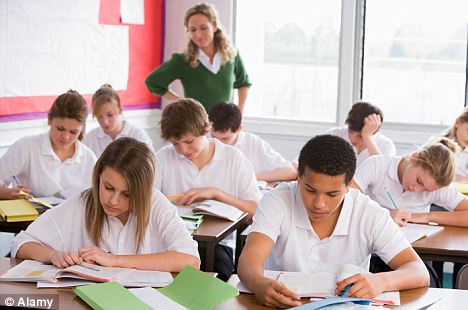(Image via The Daily Mail)
Teaching Assistants, like their teacher colleagues, get flak and plaudits in equal measure. Some of the headlines conflate teaching assistants with unqualified support staff to create ugly headlines: “Unqualified Teaching Assistants ‘Harming Pupils’ Education’ Teachers Say“. When you spy some of the evidence, like the headlines from the Education Endowment Foundation toolkit, you may be forgiven for questioning the whole notion of having teaching assistants in schools.
The problem is that these headlines and averages don’t tell the whole story. In a recent report, Dr Jonathan Sharples, Chief Researcher at the EEF, has shown that given the right deployment (utterly unlike the approaches criticised in the Telegraph article link above) that Teaching Assistants can have a very positive impact. Of course, the crucial caveat is that it depends how TAs are deployed, as Sharples notes:
“Crucially (and you can’t emphasise this enough!), these positive effects are only observed when TAs work in structured settings with high-quality support and training.”
Good schools concentrate on skilled, purposeful deployment like this – the kinds that see TAs have real impact.
Teachers too have a crucial role in utilising the human resource of TAs. In my recent book for English teachers, ‘Teach Now! Becoming a Great English Teacher‘, I give the following advice:
- Co-plan whenever possible. In the rush of a school week, sometimes our planning isn’t up to scratch. Sometimes we have crafted a masterpiece! Either way, share it with your teaching assistant. Seek their opinion and their critique. Ensure that they understand their role.
- SEN and a shared responsibility. Too often, teachers simply let teaching assistant sits with students with SEN like Velcro. Yes, some students are statemented for specific support, but even then, you should utilise the opportunity to work closely with that student and expect the teaching assistant to work with and monitor other students.
- Most able student support. It is a peculiarity of our school system that we focus much of our money and attention on one end of the learning spectrum. Ask yourself how the teaching assistant could help challenge the most able students in the classroom.
- Reading role models. One of our core purposes is to promote and celebrate reading and all of its attendant benefits. We should therefore take every opportunity for all the adults leading the learning to share in the pleasure of reading. Involve your teaching assistants whenever you can.
- Lead the learning together. We should take each opportunity to openly ask your teaching assistant questions of how specific students are progressing; seeking feedback and generally seeking their opinion and promoting their opinion. Students remember when adults share their positive experiences of reading and writing, so explore the opportunity to do so.
- Working with small intervention groups. This can be undertaken within class and without. It should never be about simply removing challenging students. The teaching assistant should have a crystal clear understanding of the task and the expectations for each student. (The Education Endowment Foundation has identified interventions that have the most impact – like “Switch On Reading, Catch Up Numeracy, Catch Up Literacy and Talk for Literacy“ via Jonathan Sharples – EEF)
- Giving feedback. You should make obvious the feedback about individuals or groups in the class. Talking about how students have undertaken their task can be an opportunity for you all to celebrate progress or to reiterate expectations. Again, involve teaching assistants in feeding back upon exemplar answers, noting patterns, building upon your own feedback etc.
- Position in the plenary. Often, the teaching assistant is in the ideal position to evaluate and comment upon the progress made in the lesson. They can observe specific students who you have identified at the outset, or make more general observations.
The EEF have provided a tremendously helpful report entitled ‘Making Best Use of Teaching Assistants’. Helpfully, it does what it says on the tin. By following the guidance, tapping into our expert resource, we can unleash the power of the teaching assistants.

Pingback: The Power of Teaching Assistants – HuntingEnglish | The Echo Chamber
Pingback: ORRsome blogposts May 2015 | high heels and high notes
Teaching assistants can help manage behaviour in the classroom, for example keep children on task. They can also replicate the steps in a lesson modelled by the teacher and boost independent thinking with appropriate questions. However, children with specific learning difficulties require the skills and knowledge of a specialist teacher who is able to plan, prepare, deliver and monitor a systematic learning programme tailored to the needs of the individual in accordance with a diagnostic assessment. Teachers, specialist teachers with SEN training and teaching assistants – that’s the winning team.